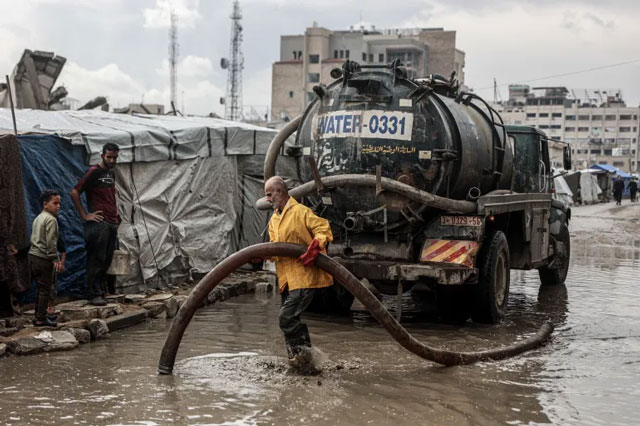Daijiworld Media Network - Gaza
Gaza, Nov 15: A brief spell of winter rain has pushed displaced Palestinians into fresh turmoil, as makeshift camps across Gaza City and northern Gaza were flooded, soaking tents, clothes and essential belongings. The United Nations has warned that Israeli restrictions on humanitarian aid continue to leave hundreds of thousands without proper shelter even after last month’s ceasefire.
In Gaza City, Abdulrahman Asaliyah, one of the displaced, described the scene as heartbreaking. “Our mattresses, clothes, everything is soaked,” he told Al Jazeera. “We are calling for help, for new tents that can at least protect people from the winter cold.” He said nearly two dozen people spent hours trying to drain the water, yet the tents remained unlivable. “This winter rain is a blessing from God, but many families no longer wish for it, fearing for their children’s lives,” he added.

Gaza’s civil defence agency said the flooding mainly affected northern Gaza, where hundreds of thousands have returned since the October 10 ceasefire between Israel and Hamas. Central Gaza’s Deir el-Balah also reported flooding, with the agency urging the world community to step in and “address the suffering” of Palestinians living in destroyed homes or fragile tents after two years of war.
“We urge the swift delivery of homes, caravans and tents to these displaced families, especially as winter has only just begun,” the agency said.
Despite the ceasefire allowing slightly more aid into the region, international groups say critical shortages persist. Food, medicine and shelter remain far below required levels. Shelter-aid organisations estimate that nearly 260,000 Palestinian families—almost 1.5 million people—are at risk this winter.
The UN agency for Palestinian refugees (UNRWA) said it currently has supplies to support up to 1.3 million people, but accused Israel of continuing to block deliveries into Gaza, in violation of the ceasefire’s humanitarian clauses. “We have a very short chance to protect families from winter rains and cold,” warned Angelita Caredda of the Norwegian Refugee Council.
Reporting from Deir el-Balah, Al Jazeera’s Hind Khoudary said even 30 minutes of rain was enough to overwhelm the fragile tents. “They have been using these worn-out tents for two years,” she said. “Children are walking barefoot. Families have no blankets, no winter clothes, and aid entering Gaza is still restricted.”
In Gaza City, the despair was evident. Abu Ghassan, another displaced resident, said his family now “no longer has a normal life.” Holding up drenched bedding, he added, “I’m lifting the mattresses so the children don’t get soaked. But they were already drenched. We don’t even have proper tents.”
As temperatures continue to drop, the fear among families is rising—another harsh winter is setting in, but the shelter and relief they desperately need remain out of reach.